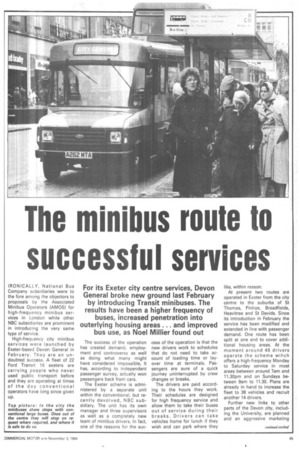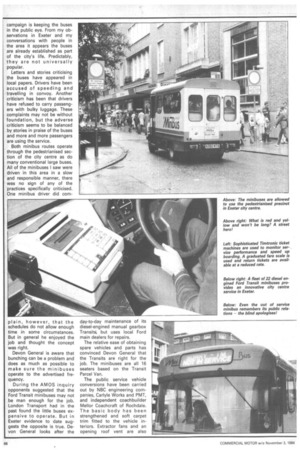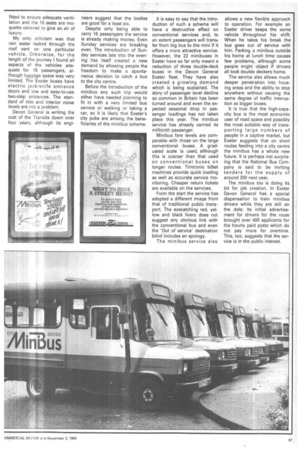The minibus route to successful services
Page 67

Page 68

Page 69

If you've noticed an error in this article please click here to report it so we can fix it.
IRONICALLY, National Bus Company subsidiaries were to the fore among the objectors to proposals by the Associated Minibus Operators (AMOS) for high-frequency minibus services in London while other NBC subsidiaries are prominent in introducing the very same type of service.
High-frequency city minibus services were launched by Exeter-based Devon General in February. They are an undoubted success. A fleet of 22 Ford Transit 16 seaters are carrying people who never used public transport before and they are operating at times of the day conventional operators have long since given up.
Top picture: In the city the minibuses share stops with conventional large buses. Once out of the centre they will stop on request where required, and where it is safe to do so.
The success of the operation has created demand, employment and controversy as well as doing what many might have considered impossible, It has, according to independent passenger survey, actually won passengers back from cars.
The Exeter scheme is administered by a separate unit within the conventional, but recently devolved, NBC subsidiary. The unit has its own manager and three supervisors as well as a completely new team of minibus drivers. In fact, one of the reasons for the suc cess of the operation is that the new drivers work to schedules that do not need to take account of loading time or layover time at terminals. Passengers are sure of a quick journey uninterrupted by crew changes or breaks.
The drivers are paid according to the hours they work. Their schedules are designed for high frequency service and allow them to take their buses out of service during their breaks. Drivers can take vehicles home for lunch if they wish and can park where they At present two routes are operated in Exeter from the city centre to the suburbs of St Thomas, Pinhoe, Broadfields, Heavitree and St Davids, Since its introduction in February the service has been modified and extended in line with passenger demand. One route has been split at one end to cover additional housing areas. At the moment around 46 drivers operate the scheme wihch offers a high-frequency Monday to Saturday service in most areas between around 7am and 11.30pm and on Sundays between 9am to 11.30. Plans are already in hand to increase the fleet to 38 vehicles and recruit another 14 drivers.
Further new links to other parts of the Devon city, including the University, are planned and an aggressive marketing campaign is keeping the buses in the public eye. From my observations in Exeter and my conversations with people in the area it appears the buses are already established as part of the city's life. Predictably, they are not universally popular.
Letters and stories criticising the buses have appeared in local papers. Drivers have been accused of speeding and travelling in convoy. Another criticism has been that drivers have refused to carry passengers with bulky luggage. These complaints may not be without foundation, but the adverse criticism seems to be balanced by, stories in praise of the buses and more and more passengers are using the service.
Both minibus routes operate through the pedestrianised section of the city centre as do many conventional large buses. All of the minibuses I saw were driven in this area in a slow and responsible manner, there was no sign of any of the practices specifically criticised. One minibus driver did corn plain, however, that the schedules do not allow enough time in some circumstances. But in general he enjoyed the job and thought the concept was right.
Devon General is aware that bunching can be a problem and does as much as possible to make sure the minibuses operate to the advertised frequency.
During the AMOS inquiry opponents suggested that the Ford Transit minibuses may not be man enough for the job. London Transport had in the past found the little buses expensive to operate. But in Exeter evidence to date suggests the opposite is true. Devon General looks after the day-to-day maintenance of its diesel-engined manual gearbox Transits, but uses local Ford main dealers for repairs.
The relative ease of obtaining spare vehicles and parts has convinced Devon General that the Transits are right for the job. The minibuses are all 16 seaters based on the Transit Parcel Van.
The public service vehicle conversions have been carried out by NBC engineering companies, Carlyle Works and PMT, and independent coachbuilder Mellor Coachcraft of Rochdale. The basic body has been strengthened and soft carpet trim fitted to the vehicle interiors. Extractor fans and an opening roof vent are also fitted to ensure adequate ventilation and the 16 seats are moquette covered to give an air of luxury.
My only criticism was that rain water leaked through the roof vent on one particular vehicle. Otherwise, for the length of the journey I found all aspects of the vehicles adequate for 16 passengers, although luggage space was very limited. The Exeter buses have electric jack-knife entrance doors and low and easy-to-use two-step entrances. The standard of ride and interior noise levels are not a problem.
Devon General is writing the cost of the Transits down over four years, although its engi
neers suggest that the bodies are good for a least six.
Despite only being able to carry 16 passengers the service is already making money. Even Sunday services are breaking even. The introduction of Sunday services late into the evening has itself created a new demand by allowing people the freedom to make a spontaneous decision to catch a bus to the city centre.
Before the introduction of the minibus any such trip would either have needed planning to fit in with a very limited bus service or walking or taking a car, so it is likely that Exeter's city pubs are among the beneficiaries of the minibus scheme.
It is easy to say that the introduction of such a scheme will have a destructive effect on conventional services and, to an extent passengers will trans, fer from big bus to the mini if it offers a more attractive service. However, the 22 minibuses in Exeter have so far only meant a reduction of three double-deck buses in the Devon General Exeter fleet. They have also created a growing demand which is being sustained. The story of passenger level decline so common in Britain has been turned around and even the expected seasonal drop in passenger loadings has not taken place this year. The minibus service has already carried its millionth passenger.
Minibus fare levels are comparable with those on the large conventional buses. A graduated scale is used, although this is coarser than that used on conventional buses on longer routes. Timtronic ticket machines provide quick loading as well as accurate service monitoring. Cheaper return tickets are available on the services.
From the start the service has adopted a different image from that of traditional public transport. The eyecatching red, yellow and black livery does not suggest any obvious link with the conventional bus and even the 'Out of service' destination blind includes an apology.
The minibus service also allows a new flexible approach to operation. For example an Exeter driver keeps the same vehicle throughout his shift. When he takes his break the bus goes out of service with him, Parking a minibus outside his home at lunch time causes few problems, although some people might object if drivers all took double deckers home.
The service also allows much deeper penetration into housing areas and the ability to stop anywhere without causing the same degree of traffic interuplion as bigger buses.
It is true that the high-capacity bus is the most economic user of road space and possibly the most suitable way of transporting large numbers of people in a captive market, but Exeter suggests that on short routes feeding into a city centre the minibus has a whole new future. It is perhaps not surprising that the National Bus Company is said to be inviting tenders for the supply of around 200 next year.
The minibus too is doing its bit for job creation. In Exeter Devon General has a special dispensation to train minibus drivers while they are still on the dole: Its initial advertisement for drivers for the route brought over 400 applicants for the hourly paid posts which do not pay more for overtime. This, too, suggests that the service is in the public interest.








































































































